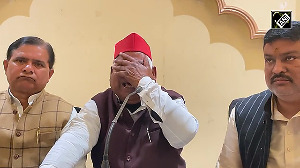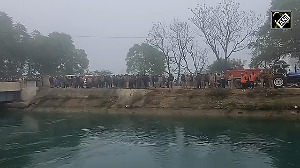Arjun Atwal is on top of the world. And why shouldn't he be? He is set to become Asia's first millionaire golfer following his exciting triumph in the Carlsberg Malaysian Open, in February. A four-stroke victory over European number one Retief Goosen of South Africa saw him clinch the title on a busy Sunday, when he had to play 28 holes on the final day. His battle against the odds -- hostile weather and tough competition that featured two of the top-10 players in the world -- also earned him the biggest prize-money of his career, a whopping US $183,330.
 Before the Malaysian victory, Atwal was going through a sluggish phase and was not able to raise his game to the level that had seen him become the first Indian golfer to win on the European Tour international schedule, when he captured the 2002 Caltex Singapore Masters at Laguna National Golf and Country Club a year back. That win also made him only the second Indian golfer to earn membership to the European Tour after Jeev Milka Singh and saw him finish 89th on the 2002 Volvo Order of Merit.
Before the Malaysian victory, Atwal was going through a sluggish phase and was not able to raise his game to the level that had seen him become the first Indian golfer to win on the European Tour international schedule, when he captured the 2002 Caltex Singapore Masters at Laguna National Golf and Country Club a year back. That win also made him only the second Indian golfer to earn membership to the European Tour after Jeev Milka Singh and saw him finish 89th on the 2002 Volvo Order of Merit.
Talking to Nagraj Gollapudi, Atwal goes back to 1995, his debut year on the Tour, and how he reached the stage where he is now. Excerpts.
How was the experience at the inaugural Dynasty Cup?
It was a good experience because this was a team event and we [the Asian team which also had Indian golfers Jeev Milkha Singh and Jyoti Randhawa] had never played a team event, as golf is an individual event. The Asian team that I was part of were the underdogs going to the final against heavyweights Japan. I quite enjoyed being part of the 12 and to come out with a victory like that, we actually were very proud.
The Malaysian Open was your first major victory after the win last year in the Caltex Singapore Masters. How does it feel?
In this game you never know when you're going to win or when you are going to make the cut. Considering that I didn't play well after winning the Caltex Singapore Masters, in 2002, it was really good to win the Malaysian Open. If I had kept the momentum up after winning the Singapore Masters, then this may not have been so special as I feel now. I had to play really well to make this comeback and win this tournament; it just strengthened my faith and me and ensured that that win in Singapore wasn't a fluke.
You seemed to have had doubts about your game after the Singapore win. What kind of demons were you fighting?
I had no doubts in my mind; it was my game that was affecting my chances. I was unable to stand the rigours of the European Tour, considering it was only my first season on the tour. All the elements and conditions were very new -- the weather was cold, it was constantly raining -- and it was just a different experience. So I just gave myself a positive reinforcement, telling myself 'it is okay, it's just my first time on the tour', and looked back to 1995 for some encouragement. It was my debut on the Asian PGA back in '95; I was just a learner but I had gained lot of confidence as I participated in more and more events.
Can you take us in through the Mines Resort and Golf Club in Malaysia?
It was my first visit and it was very good. The only difficulty was the rain delay, as every day there was thunder and lightning and play was suspended frequently. As a result, we had to play 30 holes each day on the weekend and that was quite a bit. It was physically and mentally tiring and I am glad that I came out the winner.
The fourth hole, par-four, with water all the way on the left side was difficult and I played pretty well on that hole. My best was the 15th, another par-four, where I drove in the first round and then in the third round where I made an eagle to overtake Retief Goosen of South Africa.
Inclement weather forced players to play 28 holes on the last day. How did you counter all those conditions?
The main difficulty was the heat and humidity; they are the main elements that you have to battle. I told myself that everyone who's playing the event will be battling the same so it shouldn't only be me who should start feeling it is difficult and get tired. Physically, I am very fit, as I have been working-out for the last few months. That helped me finishing the back-nine. The heat was sapping all the energies; the mind was tired, fighting the difficult conditions and the added pressure to perform well and win the event. And I hung in there pretty good.
 On the eve the tournament what were your expectations, especially considering the likes of heavyweights Retief Goosen and Padraig Harrington?
On the eve the tournament what were your expectations, especially considering the likes of heavyweights Retief Goosen and Padraig Harrington?
In golf you really don't think about the competition. If you do start thinking about them [the rest of the field] then you really can't play the game; you're trying to beat the golf course and not them. Yes, but in the hindsight, you feel that there were two top-ten players in the world out there that weekend whom I beat, and it feels good. But when you are actually playing the tournament you never get those kind of things to affect your mindset.
You and Jyoti Randhawa have been in the news in the last one year. What does it mean to Indian golf?
I hope it does mean a lot. We are part of the first-generation of professional Indian golfers playing outside the country and trying to make a name for Indian golf. People have started looking at us and respecting our game and they are realizing that we don't play just for the sake of, since it is our job, but we do try our best as any other athlete in the world. Hopefully, we get recognition for it: not recognition in terms of reward but recognition where golf becomes popular with the masses and the kids.
You are atop the Asian PGA Order of Merit and are soon going to become the first millionaire on the Asian PGA circuit. Can you take us through the journey from 1995 till date?
1995 was the first year as a professional and my first year on the Asian PGA. So there was some nervousness of the rookie still in me. The first two years (1995 & '96) I didn't play well, but I kept telling myself that it was a learning curve and I just needed to hang in there. The next two years, I started making some progress by getting into contention. I was taking part in a lot of tournaments and although I was not winning them, I was at times leading them and finishing in the top league. That helped me to gain experience and become more confident by visiting various golf courses on the Tour and knowing more about them.
By 1999, I had enough experience to win my first title -- the Indian Open, in Calcutta, which till date remains very special to me as I had won on home ground. Then, in 2000, I won my first international title in Hong Kong. The next year, although I never won a tournament I finished up fifth on the money list. In 2002, I again ended fifth on the list, after winning the Caltex Singapore Masters. But I really didn't play enough in Asia to top the list and this year, too, the same thing might happen even though at the moment am atop the list.
What do you feel about the gap between the Asians and Europeans?
It is the lack of experience that separates the players form both the continents. Lot of young Asian players are just coming out of their countries to compete like us. We started competing on the Asian Tour in 1995 and a couple of us have gone on to play big events. Jeev [Milkha Singh] has already played the Japanese Tour and Jyoti [Randhawa] will be playing in Japan this year and I am going to play in Europe. So the more we play outside the country the more experience we'll get; it will also help us play in different conditions and get used to them.
What's your immediate focus now?
In the last one year I've learnt a lot about various golf courses. And this year I am going to be choosy in the tournaments I play: playing on courses that I have liked and playing lesser events that I played last year so that I can play fewer and better events, contributing quality time which would put me in good stead for the winning the title.
I am going to play four to five weeks in a row, as opposed to the nine to ten I played last year, and try and get a break when I need it. My main goal is to get my card on the US Tour. I am going to try and get some invites on the US PGA and do well in those events to get my playing rights for next year.







 © 2025
© 2025